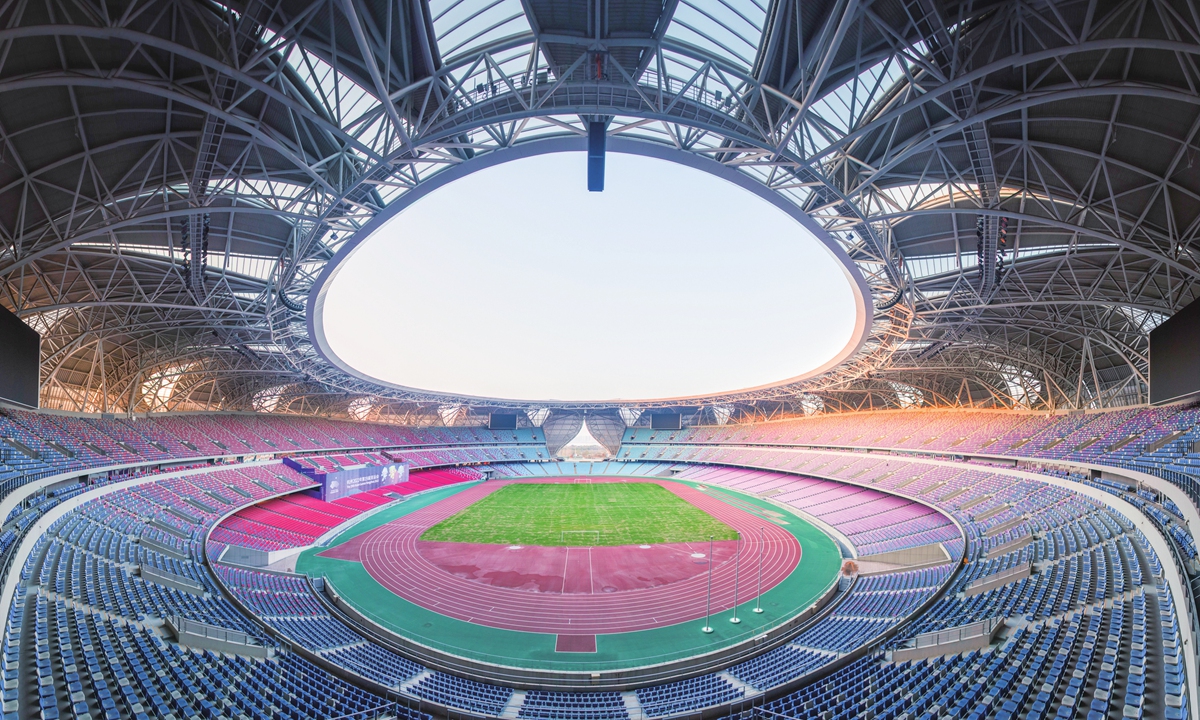
The Hangzhou Olympic Sports Center Stadium, the main venue of the Hangzhou Asian Games Photo: VCG
The 19th Asian Games, from September 23 to October 8, has demonstrated the dazzling strength of China's economy and the country's capacity to wow spectators from across the globe. The two-hour opening ceremony held at "Big Lotus" Stadium in Hangzhou, East China's Zhejiang Province, showcased a glitzy spectacle of "Made in China" high-tech innovations.
Spectators witnessed a monster-sized virtual hologram of a "running burning man" torchbearer racing across Hangzhou, as well as on the Qiantang River, before entering the stadium to light the Olympics' Flame. By pursuing the "green games" objective, the virtual "running burning man" emitted no carbon pollution, while proving that fireworks are no longer necessary to celebrate grand global events.
The city of Hangzhou, located in close proximity to China's financial hub - Shanghai, prepared for the Games long in advance. The young athletes are competing in 56 sports facilities while they can spend their down time in one of five of the Olympics villages and have access to 30 training sites.
"Be good hosts, conduct extensive friendly exchanges and demonstrate our country's good image of reform and opening up, economic development, and social progress to Asian and international communities," Al Jazeera quotes Gao Zhidan, director of the General Administration of Sport of China at the team's launch.
He also called for the athletes to "bring glory to the country, and fully demonstrate the immense power of China's modern sports practice."
The Asian Games in Hangzhou comes at an opportune time, since the Chinese are expected to enjoy the upcoming Mid-Autumn Festival and National Day holidays, known as "Golden Week" from September 29 to October 6.
China's "Golden Week" is forecast to bring boom times for the nation's tourism, hospitality and consumption sectors. According to the Chinese online travel agency platform Qunar, the number of domestic orders for hotel reservations, as of September 17, is 514 percent higher compared with the same period in pre-COVID 2019.
The country's railways operator, China Railways disclosed that it anticipates there will be around 190 million railways trips during Golden Week, surpassing the 138 million railways trips taken during the same holiday in 2019.
Additionally, China will see approximately 21 million passengers traveling by air, according to the Civil Aviation Administration of China, which is 17 percent higher than the same period in 2019.
In other words, China's economy stands resilient despite Western-based observers on China insisting that the nation's economy is headed for collapse. Higher Chinese spending levels can be seen as a vote of confidence for the domestic economy.
The Organization for Economic Cooperation & Development forecasts China's gross domestic product is still on track to hit 5.1 percent annual growth by the end of 2023 and strike a 4.6 percent growth target in 2024.
Although, China's exports have tumbled with weak global consumer demand, the Chinese government has introduced new economic stimulus measures to boost consumption and sustainable development.
Beijing is cutting taxes nationwide on the purchases of automobiles, electronics goods and home furnishings. The 20 stimulus measures were introduced in July and they have already delivered notable results. China's retail sales of consumer goods had risen by 4.6 percent in August, year-on-year to 3.79 trillion yuan, as disclosed by the National Bureau of Statistics.
Additionally, growth in services consumption for the first eight months of 2023 has surged by 19.4 percent compared with the same period in 2022.
Anti-China critics were celebrating in recent months eagerly anticipating the nation's economic to destabilize. They pointed to problems in China's real estate sector, as well as the big drop in the country's exports. But the self-praise seemed silly and counter-productive.
When China's exports enter a downturn that is an indicator the global economy is stumbling. The US, the UK and the EU are all major importers of Chinese goods. When Western consumers are buying less imports that would suggest their economies are not as robust as the Western media claims them to be.
Meanwhile, China's consumption is surging higher while its inflation rates are at a reasonable range. Chinese culture is strongly rooted in self-discipline, since they are encouraged to save money. Accordingly, when they spend more, it shows that they have confidence over their future personal financial prospects.
The Asian Games will also light a flame for the local economy in Hangzhou and the surrounding region. The city is expected to welcome more than 20 million visitors during the Games and that will deliver shared prosperity for the local hospitality sector.
We should also anticipate that many overseas visitors to Hangzhou will return to their native countries to share their experiences in China with their family, friends and colleagues. They have seen the real China and this could change their preconceived notions about the country.
Consequently, more people from around the world will become more curious about Chinese culture and could later visit the country. To understand China, it's best to come and see for yourself. Moreover, the rising tides of Asia will keep going higher while the West will likely enter a period of long decline.
The author is a commentator on Asia-Pacific affairs. opinion@globaltimes.com.cn




